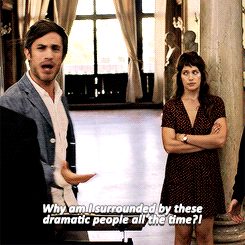Classical music is dead. Hipster trends and pop culture have brought back vinyls and record players and an undying thirst for a nostalgia that has, unfortunately, been only reserved to the eighties and nineties but hasn’t tended a hand to Bach, Beethoven and Mahler. Thankfully, there are still those who, eternally hopeful, believe in and are willing to fight to demonstrate that the only things decomposing are the corpses of those who wrote those immortal melodies we now recognize anywhere. Mozart in the Jungle is among those who firmly resist the idea that Millenials —ew— would never voluntarily sit through an orchestra rendition of the Moonlight Sonata.
The Amazon-produced television show —as much ‘television’ as we can consider this online platform— revolves around Rodrigo de Souza, a Mexican orchestra conductor who is newly in charge of the New York Symphony. Through his eyes and those of Hailey Rutledge —from here on out referred to as Hai Lai in honor of Rodrigo’s pronunciation of her name—, an oboe player with dreams of achieving the position of First Oboe and who “plays with the blood”, we are guided through the New York City of sex, drugs, and music. And, truly, Amazon doing something other than over-exploiting its employees? Who knew they had it in them!

To be fair, it’s not just something. It’s a quality something. The cinematography is worthy, but undeniably the show’s strength resides in its script and its cast. Like a perfectly composed Tchaikovsky tune, the dialogues are dynamic, fun —it’s a comedy, albeit the dramatic touches are colorful and bring a deepness to the show that seems hard to imagine at first glance—, rich and clever without struggling to constantly be overly witty and sharp. It knows its strengths and exploits them accordingly. And, perhaps most importantly, it doesn’t over-explain. In a show so specific to a certain lingo, treating the audience as less-informed is an easy mistake to fall into. But the cleverness with which it treats the audience as an equal —explaining musical terms always within the show’s narrative context, and sometimes simply taking for granted that the audience understands what’s being talked about— allows the show not only to make classical music more accessible and easy to understand —and most importantly, connect to— but it also earns the audience’s trust and forces them to be engaged and interested in what is happening at all times.
Of course classical music serves only as the backdrop to what truly matters on this show —and any other show, for that matter—, the intercrossing narratives of the characters. Not completely an ensemble, the show’s cast shines through every episode. The orchestra is a cast, a group of people, a family, but ultimately we are more interested in a few of the players rather than all of them individually. The feeling of collectivity is used to further pronounce the group-like qualities of orchestra more than anything else narrative-wise. Characters are not only played with stellar preciseness, but are also deep and complex, the morals and ethics of which are constantly being questioned. And yet, despite it all, they are still characters one ends up forming an attachment to.

Similarly, the predominance of female characters continues to prove that, once again, those better-written shows place a lot of their dramatic and narrative weight on characters that are not, in fact, white males. Hai Lai —I hope this is an acting choice, and a brilliant one at that— starts off as a shy and self-conscious, not-too-confident character who progressively matures and develops into an independent woman who believes in herself and is adamant on accomplishing her dream, whatever it takes. She, in turn, is helped by other female characters whose sexual tendencies —bisexuals exist in fiction too!— and choices are more than questionable. Truthfully, as the show progresses —it is now in it’s third season—, the women’s sexual lives gain a more ambiguously acceptable quality —read: they partake actions that are frowned upon in society simply because it’s women who are taking the lead in them— but never once are they judged or criticized for them.
However, as strong as the females are, and as beautifully written as all of the characters are, Gael García Bernal’s Rodrigo absolutely steals the show. If there is only one reason why you should binge-watch Mozart, it is undoubtedly his performance —and, for once, the Golden Globes are accurately endowed. His eccentric portrayal of this Jack Sparrowesque character who ultimately results in the perfect mixture between BBC’s Sherlock’s Sherlock and Doctor Who’s Doctor —Matt Smith’s Eleventh Doctor and Peter Capaldi’s Twelfth, more than any others— is the show’s golden Snitch. A character who speaks to apparitions of great composers and who wears pashminas for pleasure —as well as cashmere pants of questionable fashion accuracy— could’ve easily been portrayed as the pedestal-placed genius he is, and fallen out of the audience’s grasp. His extravagant thoughts and ideas could’ve failed to connect with the audience. But García Bernal’s performance accomplishes exactly the opposite, and it’s hard not to fall in love with the somewhat crazy and insane maestro. The absurd and deadpan humor the show is rooted in works in his favor, but he expertly picks his battles and ultimately performs an outstanding character.


So if you’ve never listened to Chopin’s Minute Waltz Op. 64 No. 1 and have no clue who Olivier Messiaen is, allow Mozart in the Jungle to introduce you to the pleasures of a well-tuned oboe and a pair of synchronized violins. And, if like most people, you have absolutely no clue as to what role a conductor of an orchestra actually takes, let Rodrigo de Souza lecture you. Perhaps what you will gain afterwards will be something far more exciting and useful than a simple guide through the history of classical music.
Which, to be fair, might not be as dead as we thought.


Deja un comentario